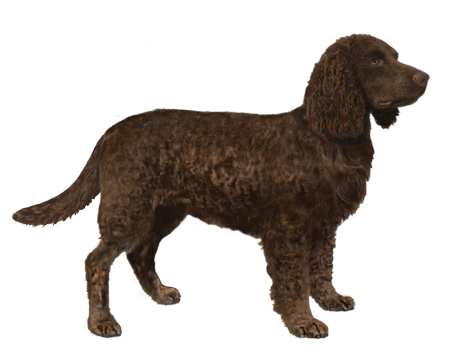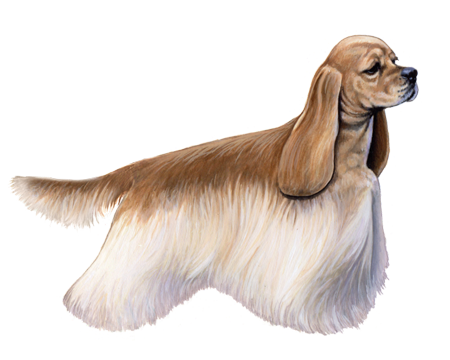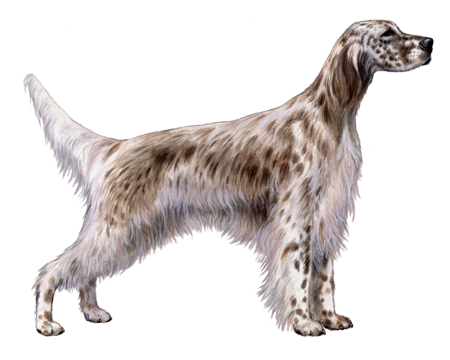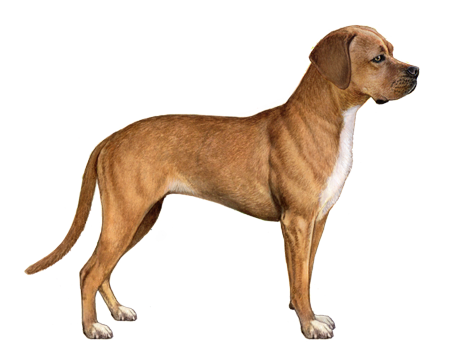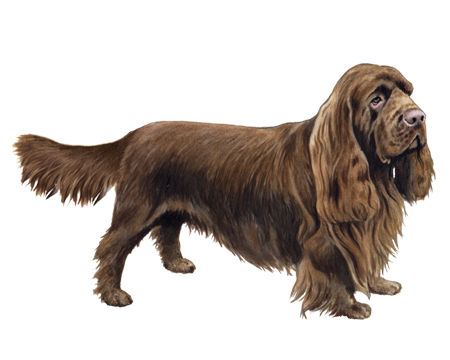
Golden Retriever
The Golden Retriever is an intelligent breed that excels in a wide range of duties and activities. In fact, it's one of the most versatile dog breeds in the world. Golden Retrievers are active, loving, and eager to please. They also have a very gentle temperament. Given all this, it's no surprise that they're among the most popular dogs in the U.S.
Interested in discovering if your dog is a Golden Retriever?
Check out Wisdom Panel's DNA tests.

Golden Retriever Traits
General Appearance
Golden Retrievers are symmetrical, powerful, balanced dogs. Their eyes offer a friendly, intelligent expression.
Coat and Coloring
The Golden Retriever's coat is dense enough to be textured, though it's neither short nor especially long. They also have a water-resistant undercoat.
As the name suggests, the breed is generally a rich golden color, ranging from a light gold to a darker reddish gold. The coat and tail are feathered with paler creams, though the dog is never white.
Distinctive Physical Traits
Golden Retrievers have strong, well-balanced bodies and short coupling (meaning, the space between their last rib and their pelvis is relatively short).
Their eyes are medium-large with dark, close-fitting rims, set well apart. The preferred color is dark brown, though some have medium-brown eyes. The Golden Retriever's tail is thick and muscular at the base. It's carried level, or with a slight upward curve.
Golden Retriever Temperament
Golden Retrievers are one of the best breeds for families. They're devoted and affectionate to their people, and love being involved in all family activities.
They're generally happy-go-lucky dogs, and many maintain their puppy-like attitudes into adulthood. Though typically a calm, easy-going breed, Goldens can sometimes be energetic or nervous.
Their friendly nature makes them poor watchdogs, but they make excellent pets and wonderful aids for the elderly and disabled. They're playful and trustworthy with children, and typically get along with other pets and dogs.
Golden Retrievers need ample attention and human companionship, as well as regular exercise. Due to their retriever instincts, they'll try to carry just about anything they can get into their mouths. For them, retrieving is a favorite pastime. So, the way to a Golden Retriever's heart may just be through a game of fetch.


Golden Retriever History
Golden Retrievers can trace their origins back to 19-century Scotland. They were bred as hunting dogs and used to locate and retrieve game from land and water.
Sir Dudley Majoribanks, Lord of Tweedmouth, conducted the initial efforts to breed the Golden Retriever. He kept detailed records of breedings between 1840 and 1890. His goal was to create a dog that could handle the rainy weather and rugged terrain of the Scottish Highlands. He began with a yellow dog from Brighton and an English retriever with a liver-colored curly coat called a Tweed Water Spaniel, now extinct.
He later introduced Labrador Retrievers, Newfoundlands, Red Setters, and Bloodhounds into the mix. The Kennel Club of England accepted the breed in 1903 as the "Golden Flat Coat." It was the first breed to be shown in an English dog show in 1908.
The breed was introduced to the United States in the late 1890s, and it received the name "Golden Retriever" in 1920. The American Kennel Club recognized the breed in 1932.
Today, Golden Retrievers are among the most popular family dogs, thanks to their compatibility with other dogs and people. They are great members of the family, and they excel as both guide and assistance dogs and search and rescue dogs.
Golden Retriever Care
Nutrition
To meet a Golden Retriever's nutritional needs, you should feed a high-quality food that's appropriate for their life stage (e.g., puppy, adult, senior.) They will benefit from diets formulated for large-breed dogs. In particular, large-breed puppy diets keep them from growing too fast, which may decrease the incidence or severity of hip dysplasia as they age.
Golden Retrievers are prone to gaining weight. To prevent obesity, you should closely monitor their food intake. Avoid accidental overfeeding by measuring out their portions using a standard measuring cup, and be sure to account for treats when calculating their daily calorie intake. As a general guideline, treats should make up no more than 10% of their daily calories.
Grooming
Golden Retrievers need to be brushed about two times a week. Twice a year, they shed their thick undercoats. During these periods, you will likely need to brush more frequently.
Trimming nails, cleaning ears, and brushing teeth should also be part of every dog's grooming routine, regardless of breed.
Exercise
To maintain their calm demeanors, Golden Retrievers need plenty of daily exercise. And they enjoy many activities, including jogging, fetch, and trips to the dog park.
Golden Retrievers also enjoy dog sports—such as hunting, tracking, and agility. They love to swim, as well. For a fun game that takes advantage of their natural swimming ability and affinity for water, try playing fetch with floating toys.
It's also important for Golden Retrievers to exercise their minds. Achieve this by giving them puzzle toys or practicing obedience commands with them.
Training
Golden Retrievers are eager to please, which makes them fairly easy to train if you use gentle but firm techniques. They're also very food-motivated. This may make it easier to teach them to drop retrieved items not intended for play (such as one of your favorite shoes.)

Golden Retriever Genetic Health Conditions
-
Degenerative Myelopathy
Degenerative Myelopathy (DM) is a neurological disorder, usually affecting dogs in their senior years. Loss of hind limb coordination is an early sign of disease, and as the condition progresses the hind limbs of affected dogs become increasingly weak.
-
Dystrophic Epidermolysis Bullosa (Discovered in the Golden Retriever)
Dystrophic Epidermolysis Bullosa is a skin disorder that causes blistering of the skin and irritations in the oral cavity and upper digestive tract. These disease signs may diminish around 8 months of age.
-
Ichthyosis Type 2 (Discovered in the Golden Retriever)
Ichthyosis Type 2 (ICH2) is a skin condition characterized by chronic scaling of the skin. The associated genetic variant has been identified in the Golden Retriever.
-
Congenital Eye Malformations (Discovered in the Golden Retriever)
Congenital Eye Malformations is a rare disorder that can cause a variety of abnormalities affecting one or both eyes and may impair vision. The associated genetic variant has been identified in the Golden Retriever.
-
Congenital Myasthenic Syndrome (Discovered in the Golden Retriever)
Congenital myasthenic syndromes (CMSs) are a group of inherited neuromuscular disorders. The CMS in Golden Retrievers is characterized by generalized muscle weakness and abnormal gait. The causative gene for CMS in Golden Retrievers is COLQ.
-
Muscular Dystrophy (Discovered in the Golden Retriever)
Muscular Dystrophy is a severe disorder that causes muscle degeneration and weakness due to the formation of excess connective tissue in the muscle.
-
Neuronal Ceroid Lipofuscinosis 5 (Discovered in the Golden Retriever)
Neuronal Ceroid Lipofuscinosis 5 (NCL5) is a progressive neurological disorder characterized by uncoordinated movements, behavioral changes, vision loss, and epileptic seizures. The associated genetic variant has been identified in the Golden Retriever.
-
Progressive Retinal Atrophy (Discovered in the Golden Retriever - GR-PRA1 variant)
Golden Retriever progressive retinal atrophy 1 (GR-PRA1) is an inherited eye disorder which causes degeneration of the light sensing retina at the back of the eye, resulting in progressive loss of vision.
-
Progressive Retinal Atrophy (Discovered in the Golden Retriever - GR-PRA 2 variant)
Progressive Retinal Atrophy (PRA) is an inherited disorder that results in degeneration of the light sensing retina at the back of the eye, leading to progressive vision loss and eventual blindness. Golden Retriever PRA, Type 2 (GR-PRA2) is a late onset form, with the average age of diagnosis being 6 years old. The associated genetic variant has been identified in the Golden Retriever.
-
Sensory Ataxic Neuropathy
Sensory Ataxic Neuropathy (SAN) is a slowly progressive neurologic disorder causing uncoordinated movements and impaired balance. This variant is a risk factor causing an increased risk of disease for dogs with maternal Golden Retriever ancestry. The clinical significance of this variant in dogs lacking maternal Golden Retriever ancestry is not yet clear.
Knowing if your Golden Retriever is a carrier or at-risk for these conditions can help you and your veterinarian plan for your pup’s lifelong care. With Wisdom Panel™ Premium, you can get results for over 200 genetic health tests.
Breed Group
Sporting
The sporting group breeds are incredibly diverse in personality and appearance, but can be characterized as very sturdy. They were developed to work closely with people and in general have a very responsive nature and high intelligence.




